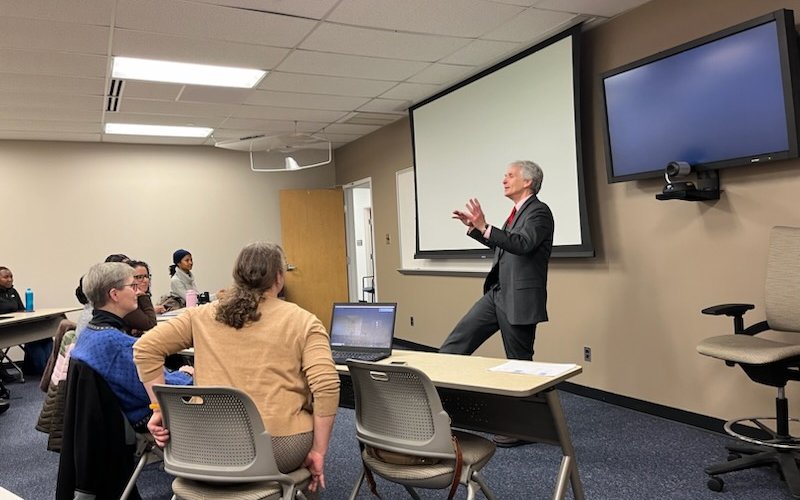Correctional Health Care Field Trip & Interactive Learning Session

ALBANY, N.Y. (Feb. 6, 2024) -- The University at Albany School of Public Health recently hosted Dr. Marc Stern for “Correctional Health Care”, an interactive session followed by a guided tour of the Albany County Jail. The event enabled students, faculty, and colleagues to learn more about health care services within correctional facilities and expand their understanding of correctional health care.
“Our country has the highest incarceration rate in the world with over 2 million people incarcerated on any given day, and there are striking racial and ethnic disparities,” explains Dr. Rachel de Long, clinical professor and director of the Fellowship in Applied Public Health (FAPH) at the School of Public Heatlh. “This has staggering implications for the well-being and life course not only of incarcerated individuals, but for their families and communities. Despite these numbers, incarcerated people are often an overlooked priority population for public health attention.”
Dr. de Long brings experts like Dr. Stern into her classroom – both virtually and in person – to provide students with insight on areas of public health that need critical attention.
A nationally recognized physician expert and a consultant on correctional health care based at the University of Washington, Dr. Stern previously served as assistant secretary for health care at the Washington State Department of Corrections, regional medical director for the New York Department of Corrections, and medical director for the Albany County Jail. He has provided consultation on public health and patient safety in jails, prisons, and ICE detention to numerous state, federal, and advocacy entities, including the CDC, U.S. Department of Justice, U.S. Department of Homeland Security, National Institute of Corrections, ACLU’s National Prison Project, Human Rights Watch, and federal courts.
For over 20 years, Dr. Stern has been a partner to UAlbany’s FAPH program, and currently leads the FAPH journal club, in which he works one on one with fellows and DrPH students.
“About once a year, Dr. Stern generously does a session with our students on his work in correctional health care. This year we were fortunate to have him make that visit in person, and we had significant interest from students and colleagues across UAlbany, the state health department, and state agencies,” says de Long.
Colleagues from the CDC and U.S. Department of Justice joined remotely for a portion of Dr. Stern’s session to talk about surveillance data related to correctional systems and incarcerated people.
Tristan Sharatt, a current Fellow in Applied Public Health, notes that the event helped him to expand his view on this area of public health.
“This event represented an unparalleled insight into how clinical and public health care are facilitated in a sizeable and largely forgotten portion of the population in the United States. Dr. Stern has a unique perspective in the facilitation of correctional healthcare in the variety of roles that he has held over the past couple of decades,” Sharatt says.
Dr. Max Weidmann, also a Fellow in Applied Public Health, echoes Sharatt’s sentiments.
“The presentation went beyond the statistics to show us how the heart-wrenching conditions in correctional facilities contribute to poor health outcomes for incarcerated populations. Of course, one could not convey the depth and breadth of Dr. Stern's experience with the issue in 3 hours, but it was an inspiring start to a conversation all of us in public health should have,” Weidmann says.


